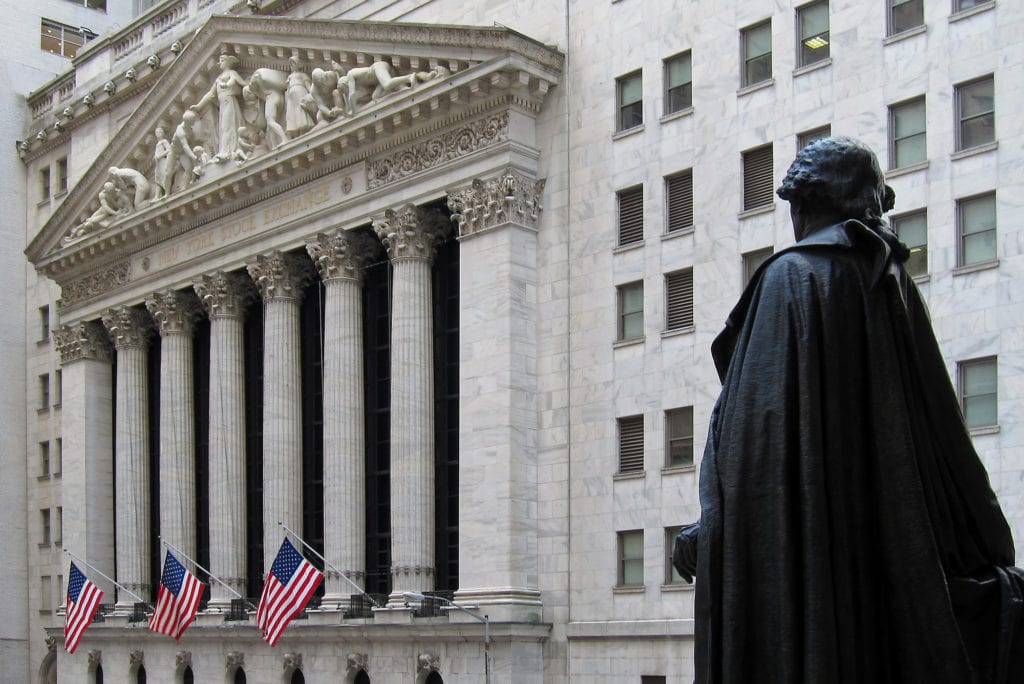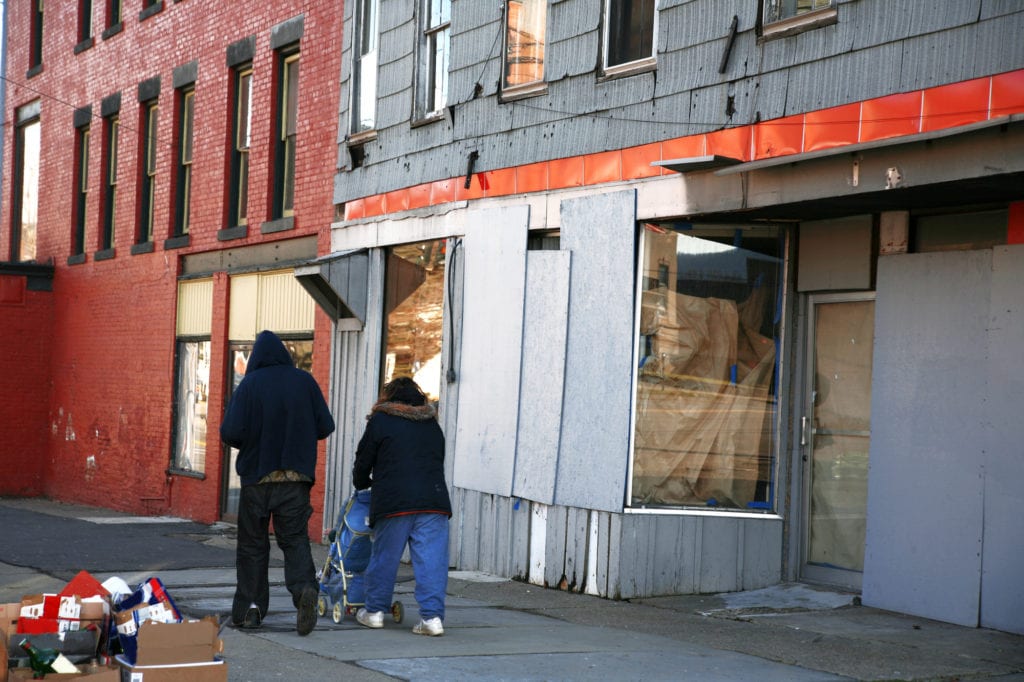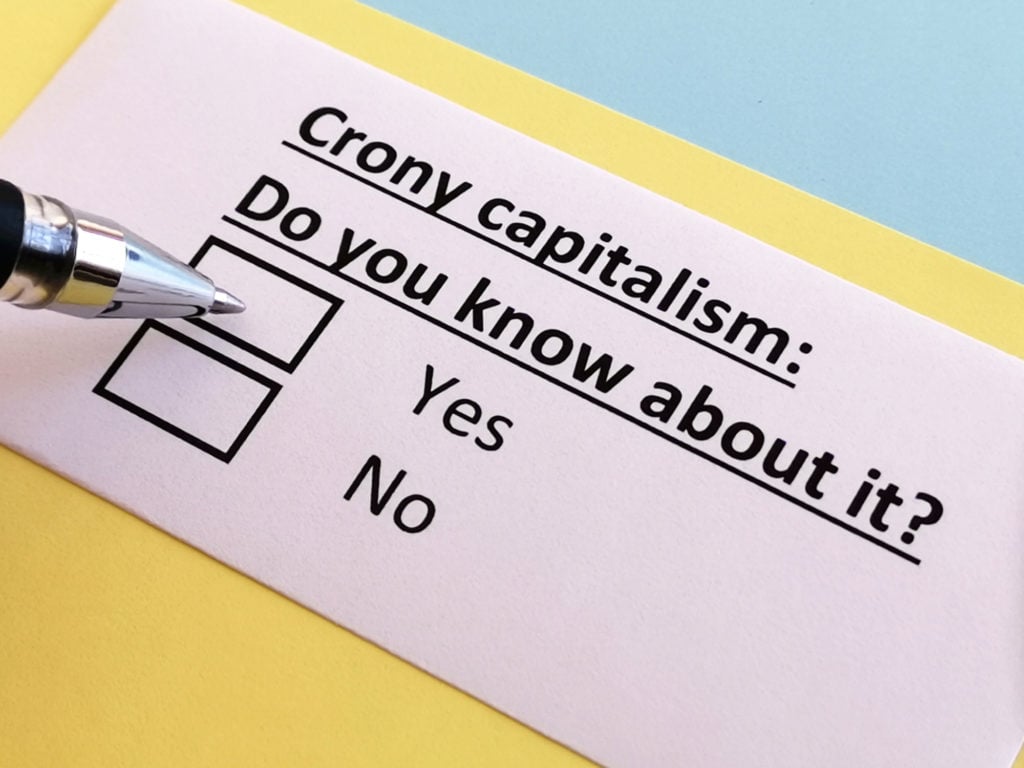Some say the biggest threat to capitalism is socialism. But many economic experts agree crony capitalism is what may lead to the collapse of America. Forget left-leaning politicians or even China's rise as the world's greatest economic power. The ideas of guaranteed income and Medicaid for all may be problematic. But many economic analysts believe it's the loss of a free-market economy that poses the greatest threat. This loss crushes economic opportunity, which has far-reaching effects.
What is crony capitalism? And why does it pose a threat to American democracy?
Can we even call America a capitalist country as it currently exists? With the latest media coverage and political debates, it can be challenging to know the truth. It's hard to separate a carefully-crafted fictional narrative from reality.
Is socialism vs. capitalism the fight we are fighting? Or is it more like crony capitalism vs. capitalism?
We are here to bring some clarity to the topic. In this article, you'll learn:
- What is crony capitalism?
- What is wrong with capitalism?
- Is America a capitalist country anymore?
- The differences between crony capitalism vs. capitalism
What Does Crony Mean?
The term "crony" is a derogatory word for a companion or close friend. In more informal terms, it's two pals who get together to create an unholy alliance. Simply put, they are up to no good. When you join the word "crony" with "capitalism," you have a dangerous combination.
The simple definition of crony capitalism is:
The direct use of money and time for personal economic gain between two parties without productive wealth creation.
It describes an economy in which business success depends on close relationships between business people and government officials. The alliance creates special privileges for the political and economic elite. And it offers little-to-no benefit to members of the general public.
Cronies build wealth. However, they don't do it through innovation or by meeting consumer needs. They get rich by using their status and government connections to legislate and regulate in a way that benefits them financially.
How do crony capitalists make their money?
- Grant handouts
- Bailouts
- Permits
- Regulations
- Transfers
- Lobbying
- Government licenses
- Special tax breaks
They don't play fair in a competitive market. Rather, they use their political and economic connections with other elites to line their pockets.
What Does Cronyism Mean?
Cronyism is when politicians offer government privileges or special positions to certain businesses and industries. They do so because they know they can use the favor to benefit themselves. For instance, one example of cronyism is a politician appointing friends or associates to powerful positions, even if they don't have the proper qualifications or experience.
When they appoint these individuals, cronies have an ulterior motive. They are giving them a little power, so they can use it to their financial advantage when it suits them. Typically, a crony appoints or offers the advantages to another crony when they need support for their proposal or position. They carefully choose people who they believe will not work against them. In the case of politicians, this usually means choosing people who will not vote against issues that are important to them.
Cronyism is a negative term in politics. However, it seems to be growing rampant in the United States. It involves the act of buying and selling favors, including:
- Votes
- Ambassador roles to exotic places
- Business advantages
Perhaps the most devastating characteristic of cronyism is that it has given capitalism a bad name.
What Is Crony Capitalism in America?

Crony capitalism in America has attempted to overshadow the goodness, progress, and productivity of real capitalism. Many people equate capitalism with the special favors and cronyism taking place between the political and economic elite.
That's not capitalism. That's crony capitalism in America.
It quickly becomes a confusing mess when people consider Republicans the pro-capitalist party. But the style of capitalism many prominent republicans follow is crony capitalism. Therefore, when the general public sees the GOP giving corrupt handouts and tax cuts to big businesses, they conclude that capitalism is the problem. However, they mistakenly believe capitalism only benefits the politically powerful.
Similarly, that's not capitalism; that's crony capitalism.
Here is what crony capitalism in America looks like:
- When private businesses and interests need a boost or advantage, they know they can call on their fellow crony politicians or government officials.
- When politicians need money for their campaigns or endeavors, they know they can call up the private businesses they've helped in the past because they owe them favors.
It all takes place behind closed doors. Furthermore, it happens on both sides of the political lines. Rather than being a rarity, this practice is quickly becoming the norm in American business and politics.
What Are Examples of Crony Capitalism?
As Hunter Lewis addressed in his book, Crony Capitalism in America, there was a time when Wall Street was the epicenter of capitalism in America. Today, it's the hub for crony capitalism. The line between Washington D.C. and Wall Street is a blur. Some people believe this shift in behavior is a result of the 2008 stock market crash. However, the truth is that the cronyism between Wall Street and Washington caused the devastating crash in the first place.
The problem extends beyond Wall Street to all corners of American business. In the private sector, cronyism is commonly called the "old boys' club." It may look like networking. However, there is often corruption within the alliances. That makes it difficult to know which partnerships are legitimate and which ones are corrupt.
The favors go in cycles, benefiting the people in these elite political and business circles only. First, the politician extends government grants, tax breaks, tariff exemptions, and monopoly positions to companies and special interest groups in return for campaign donations. Then, there's an unfair advantage in the marketplace because their competitors do not have access to the same benefits.
Let's talk about specific examples of crony capitalism. Here are what some analysts are identifying as cronyism taking place in the world today:
Corporations and the Paycheck Protection Program Loans

Check out the Forbes.com article "Crony Capitalism: Why the Best Connected Businesses Got Much of the SBA Coronavirus Cash." The author reveals a severe problem with the CARES Act's Paycheck Protection Program. Instead of funds going to help businesses struggling during the COVID-19 pandemic, the money went to companies with connections.
TheFederalist.com shed additional light on this issue in its article "$2 Trillion Corona Bailout Proves Crony Capitalism Knows No Bounds." The author explained how through the coronavirus relief package, the government picked the winners and losers of the funds in what should be a free economy, writing, "the stimulus is packed with special interest handouts."
U.S. Defense Industry
In the U.S. defense industry, connections with the Pentagon and Washington lobbyists tend to be more influential than the market competition. That makes it a prime example of crony capitalism. Defense contracts are secretive and political. In addition, they often lead to specific companies receiving subsidies that the industry disguises as inefficient defense contracts.
The Meat Industry
There's a NewsMax.com editorial article, "Crony Capitalism Threatens Meat Industry." It brings attention to cronyism in America's struggling meat industry. "The American people are dependent on a few big businesses that enjoy great advantages thanks to regulation. Americans have enough to worry about in this economic downturn. They shouldn't be seeing unstocked shelves or high prices just because big business cheated the free market with the help of bureaucrats and central planners."
Federal Mortgage Companies Fannie Mae and Freddie Mac
Some analysts have gone as far as to label federal mortgage companies Fannie Mae and Freddie Mac as "piggy banks for connected politicians." For many years, political entities, not business people, managed the two mortgage companies. That arrangement led to major campaign contributions. Finally, when the companies collapsed in 2008, the corruption resulted in hundreds of billions of dollars of debt. In other words, we saw billions in taxpayers' dollars squandered.
People from both the political right and left recognize that crony capitalism gives privileges to large corporations. Brink Lindsey and Steven Teles wrote The Captured Economy. The authors represent both sides of the political spectrum. In short, they explain that policymakers will not allow these companies to fail because it negatively impacts their influence. Large companies expect the government to provide corporate welfare when they need it. This goes against the principles of free-market capitalism.
So, Is America a Capitalist Country?

The United States of America has a mixed economy. The economic system features characteristics of both socialism and capitalism. Above all, there is a level of economic freedom that allows for market competition. However, the U.S. also allows the government to intervene to achieve specific social goals to protect more vulnerable members of the public.
Is Socialism Better than Capitalism?
If you follow Capitalism.com, you likely already know our answer to this question. We believe capitalism can do immense good for society. In other words, it is a far better option than a socialist government.
Why do we promote capitalism instead of socialism? Let's break it down:
Capitalism Recognizes the Right to Self-Ownership and Responsibility
Through capitalism and the U.S. Constitution, citizens enjoy a right to be who they want to be. This is a right that does not exist throughout the world. You can produce what you want when you want it. Furthermore, you can reap the profits and benefits of your production. After all, you, not the government, have a right to the money your labor produces.
How does this differ from socialism? In authoritarian governments, your profits are not yours. In addition, they can take the money and property you earn and keep it or distribute it as they wish.
Capitalism Promotes Wealth Production
Under capitalism, you have a right to property and production. You have the power to create and deliver value in the market to earn an income. In contrast, socialism strips these rights.
Capitalism Supports Personal Responsibility
The foundation of capitalism is ownership and responsibility. You have the ability and freedom to recognize problems and needs in the world. Furthermore, you can use your creativity to solve and meet them. Capitalism promotes the idea that you, and only you, are responsible for earning the income to support yourself. In other words, you don't depend on anyone else or the government to meet your financial needs.
Capitalism Promotes Competition, Which Encourages Innovation
There's no reason to innovate if you aren't going to reap the fruits of your labor. Socialism eliminates competition and stifles innovation. True capitalism facilitates healthy competition within the marketplace. Everyone has an equal chance to be successful and profitable, regardless of political affiliation and economic status.
What Is Wrong with Capitalism?

Capitalism has a bad reputation. Furthermore, its reputation seems to worsen with each election cycle. But true capitalism isn't the problem. People misunderstand what capitalism is. They see crony capitalism happening in the country and believe that it is a representation of capitalistic principles. As a result, people have the following misconceptions about capitalism:
Misconception #1: Capitalism Promotes a Dog-Eat-Dog Economy
People who disagree with capitalism believe it causes the poor to become poorer and the rich to become richer. For instance, they say the wealthy stand on the backs of those less fortunate. While this may be true of corruption and crony capitalism, this is not how capitalism works. The heart of capitalism is a value-driven economy. It's the opportunity for all people, regardless of economic status—to create, produce, and reap the rewards of their production.
Misconception #2: Capitalism Is Only About Money
Many people who are against capitalism and for socialism adamantly believe capitalism is about greed. Yet, the underlying foundation of capitalism is freedom. People are free to pursue their goals and self-interests through the marketplace. In addition, they can use creativity and innovation to find ways to better themselves while they benefit society as a whole.
At Capitalism.com, we commit ourselves to this ideal. We exist to empower entrepreneurs to create change in their lives and the lives of those around them. Furthermore, we promote ownership of problems, solution creation, and service to people while creating personal wealth that changes lives.
Misconception #3: In Capitalism, You Are Either a "Winner" or a "Loser"
In short, some companies will succeed while others will fail. But this is not a feature that is exclusive to capitalism. The nature of capitalism increases the number of winners. The result: stronger competition and more opportunities for success than in any other system, including socialism. Even a company that loses has the freedom and opportunity to bounce back through capitalism.
In the long run, everyone in society wins in capitalism. It promotes better living standards than previous generations were able to experience. Capitalism facilitates progress.
Crony Capitalism vs. Capitalism

Why is crony capitalism not true capitalism? In short, when people comment on the unfair, dog-eat-dog nature of capitalism, they aren't talking about pure capitalism. They are talking about crony capitalism.
You might enjoy this Tom Woods Show podcast episode, "The Origins and Evils of Crony Capitalism." It features a discussion Woods has with Randall Holcombe. Holcombe is the author of Political Capitalism: How Political Influence is Made and Maintained. Holcombe states that crony capitalism is one of the biggest threats to capitalism in the United States in the podcast. He labels it "political capitalism." Cronyism goes against the public interest, benefiting the political and economic elite.
He points to the "rent-seeking" or "transfer-seeking" nature of political capitalism as the root of many problems facing the U.S. economy. Businesses seek transfers to themselves from the general public through government action. Finally, Holcomb calls out corn lobbyists and the ethanol fuel industry as being prime examples of political capitalism.
Corn lobbyists want a market for their ethanol products, so they go to the government for a transfer. As a result, the government requires that fuel contains 10% ethanol. It takes away consumer-choice and forces them to use fuel with ethanol, enriching the corn industry.
Later, when the politicians involved need favors from corn producers, they essentially extort political contributions. In addition, they promised to keep the ethanol mandate in place in exchange for their contributions.
Holcomb explains that this harms society. Certain people acquire ill-gotten gains from ordinary consumers who don't even realize the process is happening. The resources going into the transfers and lobbying could go toward meeting consumer preferences and boosting a healthy economy.
Crony Capitalism Index
The Crony Capitalism Index is a measure of crony capitalism from The Economist newspaper. It resulted from the work of Ruchir Sharma of Morgan Stanley Investment Management, New Delhi's Centre for Policy Research, and others in 2014. The purpose of the Crony Capitalism Index is to identify if and how much crony capitalism impacts people in a country with a capitalist economy.
The Economist published the last index in 2016. Among the countries suffering the most from crony-capitalism were:

- Hong Kong
- Russia
- Malaysia
- Ukraine
- Singapore
The United States was number seventeen on the list.
What Are the 6 Characteristics of Capitalism?
Nations that identify as capitalist nations have elements of socialism interwoven in their economic systems. There are varying degrees of commitment to capitalism's ideals. However, six different traits are shared among all capitalist nations.
The six characteristics of capitalism include:
1. A Two-Class System
The two classes include the capitalist class and the working class. The capitalist class possesses the means for the production and distribution of goods. The working class sells labor to the capitalist class in exchange for fair wages. Corporations or individuals who own and operate the companies run the economy. They make decisions regarding the use of resources.
2. Profit Motive
Companies in a capitalist economy exist to make a profit by selling goods and services. In short, they do not exist only to satisfy the needs of the public. Some goods may meet public needs, but they are only available when people have the money to pay for them.
3. Minimal Government Intervention
A primary ideal of capitalism is that markets should operate without the intervention of the government. There is no capitalist society that currently exists 100% government-intervention free. However, the United States is the world's most capitalist nation. But the government regulates industries, so it is not a purely capitalist society.
4. Competition
A competitive market is the foundation of pure capitalism. When there is no competition, monopolies emerge. Sellers set the prices instead of the market setting the prices. Above all, a lack of competition goes against the ideals of capitalism.
5. Willingness to Change
An essential feature of capitalism is the ability to change and adapt to meet the market's needs. Technology is the perfect example of change in a capitalistic economy. The willingness to allow for the change to improve inefficiencies within the economy is crucial in capitalism.

6. Consumer as King
In a capitalist economy, a consumer is like a sovereign king. Supply and demand are according to the consumer's needs and preferences. For entrepreneurs to profit, they must identify what the consumer wants and produce accordingly.
The Bottom Line
There are pros and cons to capitalism. Above all, it is the vehicle that drives a prosperous society forward. Pure capitalism is nothing like the crony capitalism we see in the world today, specifically in the United States. Even with the corruption and problems in our economy, we can't give up on capitalism. Jumping to socialism is not the answer. A commitment to capitalism in the U.S. allows our citizens and private businesses to bring innovation and creativity to our society. It's what enables us to improve the quality of life and enhance the standards of living.
The advantages of capitalism far outweigh the disadvantages. As lovers of pure capitalism, it's up to us to speak out and fight against crony capitalism. We can show the world that there is a better way. Finally, we must take a stand for what is best for our families, the economy, and our country.
At Capitalism.com, we promote collaborative capitalism. We believe in innovating and creating value to serve consumers better and lift each other up. Therefore, we pour our energy, creativity, and resources into facilitating an environment where entrepreneurs can own problems, create solutions, and serve people.
Ready to join us? Learn more about our community, The One Percent, where you can become a part of what we are doing to change the world and reclaim capitalism for the United States.
Or, if you're just getting started on your entrepreneurial journey, check out this free training series we made just for you.











